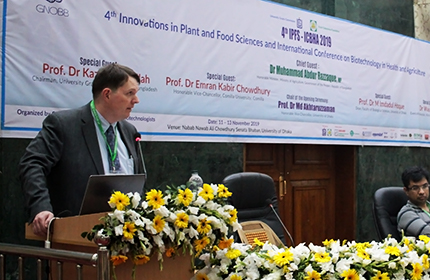4th International Conference of Biotechnology on Health and Agriculture
-

November 11, 2019-November 13, 2019
Dhaka University
Dhaka, Bangladesh
The Agriculture & Food Systems Institute’s South Asia Biosafety (SABP) Program sponsored the technical session on Biosafety and the Environment at the 4th International Conference of Biotechnology on Health and Agriculture (4th IPFS-ICBHA 2019). Jointly organized by the Global Network of Bangladeshi Biotechnologists (GNOBB) and Innovation in Plant and Food Sciences, the 4th IPFS-ICBHA 2019 took place at Nabab Nawab Ali Chowdhury Senate Bhaban, Dhaka University, on November 11-13, 2019. Convened every two years, the conference provides a platform for Bangladeshi biotechnologists from around the world to meet and exchange thoughts, ideas, and experimental findings, as well as build capacity and create awareness about the latest trends in biotechnology. The three-day event included 22 sessions and concurrent workshops.
During the technical session on Biosafety and the Environment, Dr. Andrew Roberts, Agriculture & Food Systems Institute Deputy Executive Director, delivered a presentation about the context of biosafety for biotechnology researchers, and Dr. Aparna Islam, SABP Country Manager, discussed the regulatory system in Bangladesh.
More information about the conference is available on the GNOBB website.
Presentation: Biosafety for the Biotechnologist – Navigation Biosafety Requirements as a Researcher
Dr. Andrew F. Roberts, Chief Executive Officer, Agriculture & Food Systems Institute
It has been nearly 50 years since the first use of recombinant DNA technology to modify the genome of a bacterium. Since then, the use of recombinant DNA organisms, together with a suite of other biotechnologies, has changed the face of biological and medical research. However, as biotechnology has moved from the laboratory into practical application, an array of political, social and regulatory issues have emerged which can confound research and development of recombinant DNA organisms. This presentation will review the history and context for biosafety regulation of recombinant DNA organisms and provide some insight into how a modern biotechnology researcher can effectively navigate biosafety regulatory requirements in pursuit of their research and the development of recombinant DNA organisms for use in food or the environment.
